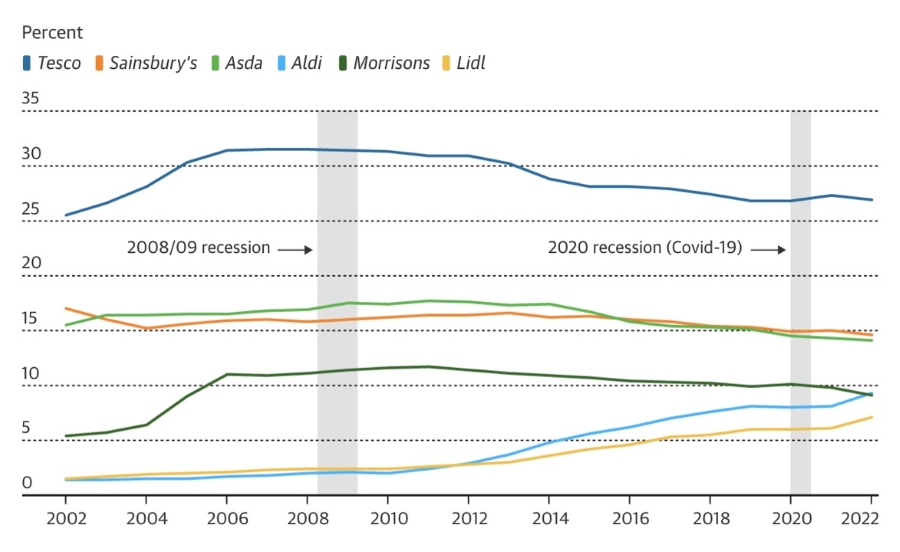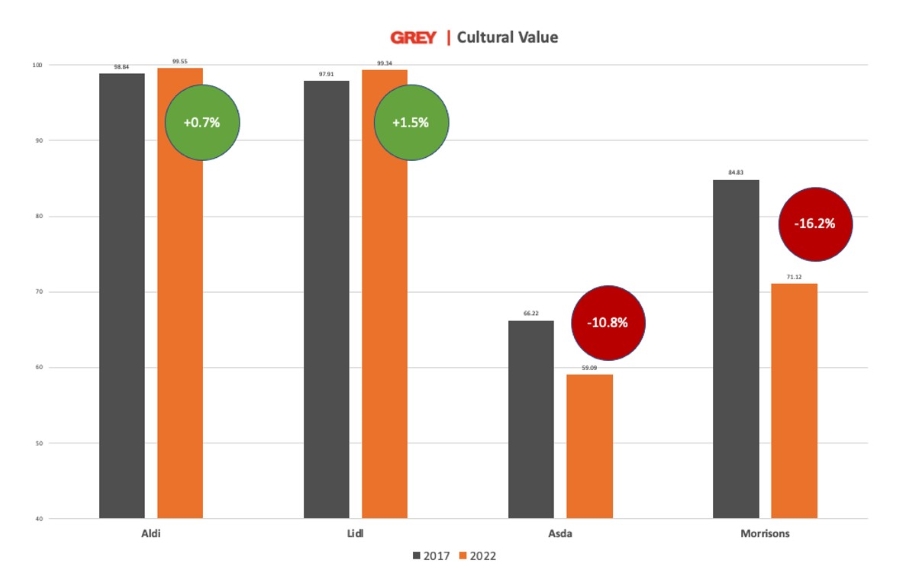Jesper Norgaard, Strategy Director at Grey London, explores how cultural relevance is driving the rise of discount supermarkets in the cost-of-living crisis.
Recently, I’ve been thinking a lot about supermarkets. The small ones that I do my top-up shopping in. The big ones where I fill up an entire trolley. Perhaps it’s because I see them pop up everywhere... But most likely, it’s because the UK is facing a cost-of-living crisis that’s putting many households under immense financial pressure, supercharging the discounters’ relevance.
Taking the UK market by storm
They’ve been around since the early 90s, but following the financial crisis in 2008, the German discount retailers – Aldi and Lidl – took the UK market by storm. People were obviously worried about money, so the discounters’ proposition was incredibly appealing. Since then, they have stolen market share left, right and centre, and last year, Aldi pushed Morrisons out of the top four supermarkets in the UK.
But this story isn’t actually about the German discounters. Because while the discounters have had plenty of reasons to pop reasonably-priced champagne, others have struggled.
A new tier of supermarkets
Prior to the financial crisis, we already had a tier of supermarkets that offered good prices – the likes of ASDA and perhaps even Morrisons. But with the discounters’ astronomical rise, they solidified and popularised a new tier of value below the established supermarkets, putting the incumbents under great pressure.
This means the traditional value supermarkets now find themselves in an awkward position. They’re not the cheapest, nor do they have the quality credentials of up-market players like Marks & Spencer. They are lost at sea, caught between two sections of the market, appealing to no one.
This is evident when you look at market share. While Aldi and Lidl are heading for the skies, the legacy players are only moving in one direction – downwards.

Source: The Guardian, ‘Big four no more’: Where now for UK grocers as Aldi overtakes Morrisons?, September 2022, UK grocery sales growth (Kantar Worldpanel data)
At Grey, you’ll hear us talk a lot about cultural value. In short, we always want our ideas to create cultural value because it moves people, the world, and of course, business forward. In fact, data shows that brands that create cultural value outperform stock market indices like the S&P500 and NASDAQ.
Using the longest-running and largest consumer study of brands in the world, we have created a proprietary Cultural Value metric that helps us understand how a brand is performing in culture. When assessing this metric, we’re seeing the same downwards trajectory as above. Since the Cultural Value metric’s inception in 2017, Aldi and Lidl have retained their strong position they’ve built since the financial crisis – they’ve even grown a little, edging closer to a perfect score – while the traditional players have fallen off a cliff with double-digit declines.

Source: Cultural Value, proprietary Grey metric, WPP BAV, 2017–2022
It’s worth noting that the astronomical rise of Aldi and Lidl and free fall of Asda and Morrisons become even more stark if we assess sub-metrics that go back to 2008 and beyond.
So, the question that’s been on my mind is: What can traditional value supermarkets like ASDA and Morrisons do to stop their decline and become great once again?
Creating cultural value
In the years after the financial crash, the discounters fully understood what was happening in culture, and they had the service to match – their no-frills business model struck a chord. And with their comparative advertising approach, they held up a mirror to the category and convinced the nation that buying essential items at a lower price isn’t something to be embarrassed about – it’s an active choice that makes you a savvy shopper. All of this helped the discounters create cultural value; something they continue to create and maintain to this day by always staying in touch with what’s going on in culture, which is why they’re out in front.
If we go back to the traditional supermarkets mentioned above, it feels like somewhere along the way, they became somewhat complacent and lost the meaningful relationship they once had with people.
To turn the decline around, the traditional players need to focus on forging these strong, meaningful connections with people and create cultural value once again. But how? That’s the billion-pound question.
Step 1: Build genuine understanding
Firstly, it comes down to genuine, deep understanding of people. I would argue that most brands in the category have a good understanding of what people need – all the functional aspects of retail. However, few have asked why people need those things. Once the legacy players unpack this, they will unleash genuine, human truths and insights that will help them understand what people really care about. This deeper understanding will start to paint a fuller portrait of the people they want to walk through their doors.
Step 2: Mind your behaviour
Secondly, using this deeper understanding, the supermarkets need to explore where their brands have permission to show up and talk in a meaningful way. This must be rooted in what their brands’ values are and what their previous behaviours have been – because all that sets an expectation in people’s minds that the supermarkets can’t deviate too far from.
Step 3: Bring the energy
Thirdly – and this is where the magic happens – they need to find the energy their brands can latch onto to be distinctive and stand out for something positive. This energy can be found in many different places; in the collision of two unrelated things, in cultural conversation, or even in agitation. Truth is, it can be really difficult to find, and you often need an outsider’s perspective, but when you do find it – oh boy, sparks fly!
By following these three steps, the traditional supermarkets will gather all the ingredients they need to create cultural value, which will help them emotionally connect with people in a meaningful way, and ultimately, win the hearts, minds, and wallets of the nation once again.

